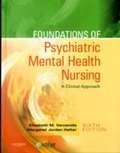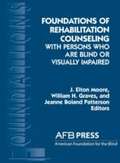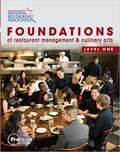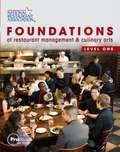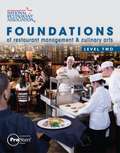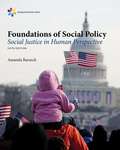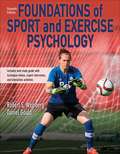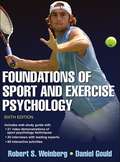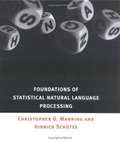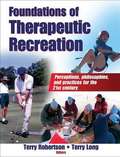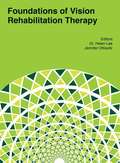- Table View
- List View
Foundations of Physical Science with Earth and Space Science -- Investigations
by Tom HsuA science lab book that investigates various scientific topics in a systematic way and arranges every investigation with a key question, data tables, learning objectives, brief introduction, icons and section title, numbered steps, illustrations and fill-in answer sheets.
Foundations of Physics
by Robert L. Lehrman Clifford SwartzTextbook detailing the basics of physics
Foundations of Psychiatric Mental Health Nursing: A Clinical Approach (6th Edition)
by Elizabeth M. Varcarolis Margaret Jordan HalterThe 6th edition of this textbook offers a clear, straightforward way to understand the often intimidating subject of psychiatric mental health nursing. Its practical, clinical perspective and user-friendly writing style help you quickly master key concepts. Clinical chapters follow the nursing process framework and progress from theory to application with a wealth of real-world examples to prepare you for practice.
Foundations of Psychology First Semester FYBA New NEP Syllabus - SPPU
by Dr Anuradha Prashant HarkareFoundations of Psychology by Dr. Anuradha Prashant Harkare is a comprehensive textbook designed for first-year Arts students under the NEP 2024 syllabus. It introduces psychology as the scientific study of mental processes, behavior, and experiences, focusing on understanding human nature and behavior in various contexts. The book delves into psychology's goals—describing, explaining, predicting, and controlling behavior—and debates its status as a science. It covers major psychological perspectives such as structuralism, functionalism, behaviorism, cognitive, humanistic, and psychodynamic approaches. Readers learn about diverse fields like clinical, counseling, educational, industrial, health, forensic, and sports psychology. Research methods, including observation, experimental, survey, and case study approaches, are explained in detail. With an emphasis on real-life examples and simple language, the book aims to make psychological concepts accessible and relatable to students and enthusiasts alike. The inclusion of historical developments and practical applications ensures a well-rounded foundation for further study in psychology.
Foundations of Rehabilitation: Counseling with Persons Who Are Blind or Visually Impaired
by J. Elton Moore William H. Graves Jeanne Boland PattersonRehabilitation professionals have long recognized that the needs of people who are blind or visually impaired are unique and require a special knowledge and expertise for the provision and coordination of effective rehabilitation services. Contributions to this text from more than 25 experts provide essential information on subjects such as functional, medical, vocational and psychological assessments; demographic and cultural issues; placement and employment issues; and the rehabilitation team. Each chapter includes a Learning Activities section that can be used in class assignments or during in-service training. Sample forms, such as a Job Analysis Worksheet, a Comprehensive Vocational Evaluation System Protocol, an Individualized Written Rehabilitation Program, and a Work Environment Visual Demands Report are included in the appendices. An extensive glossary provides easy access to clear definitions of terms.
Foundations of Restaurant Management & Culinary Arts, Level 1
by National Restaurant AssociationNIMAC-sourced textbook
Foundations of Restaurant Management and Culinary Arts, Level 1
by National Restaurant Association/ProStartNIMAC-sourced textbook
Foundations of Restaurant Management and Culinary Arts, Level 1, Lab Manual
by National Restaurant Association/ProStartNIMAC-sourced textbook
Foundations of Restaurant Management and Culinary Arts, Level 2
by National Restaurant Association/ProStartNIMAC-sourced textbook
Foundations of Restaurant Management and Culinary Arts, Level 2, Lab Manual
by National Restaurant Association/ProStartNIMAC-sourced textbook
Foundations of Restaurant Management and Culinary Arts: Level One
by Prentice HallIndustry-driven curriculum that launches students into their restaurant and foodservice career! Curriculum of the ProStart® program offered by the National Restaurant Association. The National Restaurant Association and Pearson have partnered to bring educators the most comprehensive curriculum developed by industry and academic experts.
Foundations of Restaurant Management and Culinary Arts: Level Two
by Prentice HallIndustry-driven curriculum that launches students into their restaurant and foodservice career! Curriculum of the ProStart® program offered by the National Restaurant Association. The National Restaurant Association and Pearson have partnered to bring educators the most comprehensive curriculum developed by industry and academic experts.
Foundations of Restaurant Mgmnt & Culinary Arts ( ProStart #Second Edition Level 2)
by National Restaurant AssociationProvide an industry-driven curriculum that prepares students for a career in restaurant and foodservice management.
Foundations of Social Policy: Social Justice in Human Perspective (Sixth Edition) (Empowerment Series)
by Amanda Smith Barusch<p>Reflecting the idea that social justice is a primary mission of the social work profession, this text provides a thorough grounding in policy analysis -- with coverage of policy practice and a unique emphasis on the human dilemmas inherent in the pursuit of social justice. Aligned with current standards and core competencies, Foundations of <p>Social Policy, 6th Edition introduces you to philosophical perspectives on what constitutes social justice, and identifies values and assumptions reflected in contemporary policy debates. Students have said they like how this book deepens their understanding of current developments, including topics straight from the headlines. The book also introduces you to people whose lives are influenced by U.S. policies, as well as to those who have shaped the policies.</p>
Foundations of Sport and Exercise Psychology
by Robert Weinberg Daniel GouldThe leading textbook in sport and exercise psychology is back in a revised seventh edition, and it again raises the bar with its engaging introduction to the field. Foundations of Sport and Exercise Psychology, Seventh Edition With Web Study Guide, offers a comprehensive view of sport and exercise psychology, drawing connections between research and practice and capturing the excitement of the world of sport and exercise. <P><P>Internationally respected authors Robert Weinberg and Daniel Gould continue to gather and incorporate feedback from teachers and students with each edition, building a text that addresses emerging trends and remains relevant and up to date. In-depth learning aids have been refreshed to help students think more critically about applying the material. Other updates to the seventh edition include the following: <P><P>A new chapter on diversity and inclusion addressing topics related to gender, ethnicity, race, sexual orientation, and disability New content on popular and emerging areas such as grit, mindfulness, organizational sport psychology, and technology in sport psychology Additional modern-day practical examples and anecdotes to better illustrate concepts Updated references, including more contemporary sources.
Foundations of Sport and Exercise Psychology (6th Edition)
by Robert Weinberg Daniel GouldAs the leading text in sport and exercise psychology, "Foundations of Sport and Exercise Psychology, Sixth Edition With Web Study Guide," provides a thorough introduction to key concepts in the field. This text offers both students and new practitioners a comprehensive view of sport and exercise psychology, drawing connections between research and practice and capturing the excitement of the world of sport and exercise. The internationally respected authors have incorporated feedback from teachers and students to create a text that builds on previous editions, making the material accessible to readers. In-depth learning aids have been refreshed, including chapter objectives and summaries, sidebars, key terms, key points, anecdotes, and discussion questions to help students think more critically about applying the material. Other updates to the sixth edition include the following: - More than 40 new video clips integrated into the web study guide to better demonstrate the core concepts addressed in the book - Additional emphasis on hot topics, including mindfulness, cultural diversity, ethics and professional issues, and transitions in sport - New ancillaries to help instructors teach their courses, including an image bank, chapter quizzes, and more than 122 instructor videos - Updated references, including more contemporary sources The text provides students with a unique learning experience--taking them on a journey through the origins and goals, key concepts, research development, and career options available in the field--in seven parts that may be studied in any sequence. Following an introduction to the field, the text then shifts focus to personal factors that affect performance and psychological development in sport, physical education, and exercise settings. Situational factors that influence behavior, group interaction and processes, and the use of psychological techniques to help people perform more effectively are covered, as well as the roles psychological factors play in health and exercise. The final section deals with topics of psychological development and well-being that are important to both society and sport and exercise psychology, including children's psychological development through sport participation, aggression in sport, and moral development and good sporting behavior in sport and physical activity contexts. The updated web study guide serves as an important learning tool to support the educational journey. With more than 100 engaging activities, it works directly with the text in guiding students to complete the related activities for each chapter and apply knowledge gained from the text. The study guide activities require students to do the following: - Use actual sport and exercise psychology instruments to assess their skills. - Determine how to respond to real-life scenarios (with short answers or essays). - Review research studies and experiments. - Search the Internet for relevant information. - Apply and test their understanding of principles and concepts of sport and exercise psychology. Many of the study guide activities offer compelling audio and video clips that provide an interactive look at how sport psychology consultants communicate with athletes and coaches to improve athletic experiences. These clips feature esteemed experts from the field discussing course concepts that they have studied and refined during their professional careers. To further emphasize practical application, portfolio activities can be integrated through a full semester, turning course units into a unified whole that builds upon itself for greater understanding of the field. To aid instructors, instructor ancillaries have been updated and expanded. The instructor guide, test package, and presentation package are now supplemented with an image bank, gradable chapter quizzes, and instructor videos, all available at www. HumanKinetics. com/FoundationsOfSportA
Foundations of Statistical Natural Language Processing
by Christopher D. Manning Hinrich SchutzeAs a comprehensive introduction to statistical natural language processing it contains all the theory and algorithms needed for building NLP tools and covers collocation finding, word sense disambiguation, probabilistic parsing, information retrieval, and other applications.
Foundations of Therapeutic Recreation
by Terry Robertson Terry LongFoundations of Therapeutic Recreation provides readers with a comprehensive introduction to the profession. The book draws on the combined wisdom, experience, and technical expertise of 23 professors and leaders in the field. From these contributors, readers gain access to diverse perceptions, philosophies, and practices for therapeutic recreation in the 21st century. The book showcases how the profession addresses various clients' needs throughout the life span through therapeutic programs, modalities, and activities. It also presents a wide range of applications, allowing readers to explore their personal and professional options; provides insight into the basic knowledge, attributes, and skills students need in order to thrive in the field; and delineates career paths in the profession and how a therapeutic recreation specialist works with various populations. Edited by Dr. Terry Robertson and Dr. Terry Long, Foundations of Therapeutic Recreationhas a comprehensive vision. The contributors present the broad scope of therapeutic recreation as research and practice across a diverse demographic of clients and consumers. The contributing authors explore various perspectives on therapeutic recreation and present standards and certification information that prepare students for the profession. Part I defines therapeutic recreation as a profession and provides an overview of its history and of the professional opportunities available. Part I also explores the profession's person-first philosophy and outlines the therapeutic recreation process as well as its models and modalities of practice and its allied professions. Part II delves into trends and issues, looking at demographics, economics, politics, and legislation as they affect the profession. It details international issues and paradoxes and concludes with future perspectives. Part III examines mechanisms for intervention from a number of perspectives, including orthopedic and neurological impairment, developmental disabilities, mental health, youth development, aging, and wellness. Foundations of Therapeutic Recreation contains chapter discussion questions to expand students' learning as well as Outstanding Professionals and Client Portraits sections to help students gain insight into various career paths. The book is accompanied by an instructor guide, PowerPoint presentations, and a test package available via the text's Web site to support the classroom instruction and enhance learning. The entire package gives students a solid grounding in the profession as it is today and a clear understanding of where the profession is headed tomorrow.
Foundations of Vision Rehabilitation Therapy
by Helen Lee Jennifer OttowitzFoundations of Vision Rehabilitation Therapy continues the legacy of Paul Ponchillia and Sue Ponchillia's seminal work Foundations of Rehabilitation Teaching with Persons Who Are Blind or Visually Impaired. After it was published in 1996, that book quickly established itself as an essential reference for vision rehabilitation professionals. Foundations of Vision Rehabilitation Therapy builds on that important work, reflecting changes in terminology and technology, while also incorporating best practices based on the past decades of evidence. It reflects the contemporary understanding of adult learning and skill building, providing proven techniques to help people with visual impairments develop skills and gain confidence that will equip them to lead independent, fulfilling lives.

